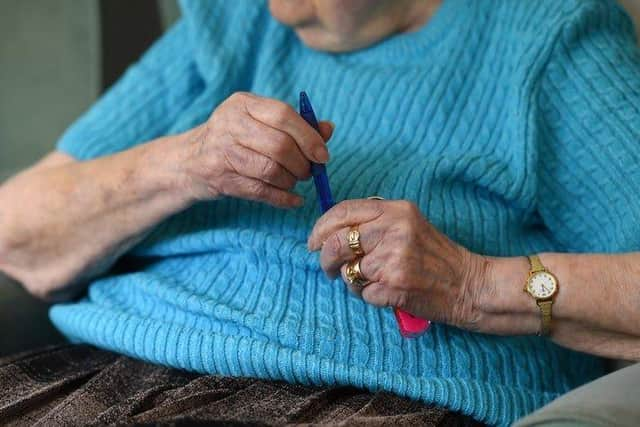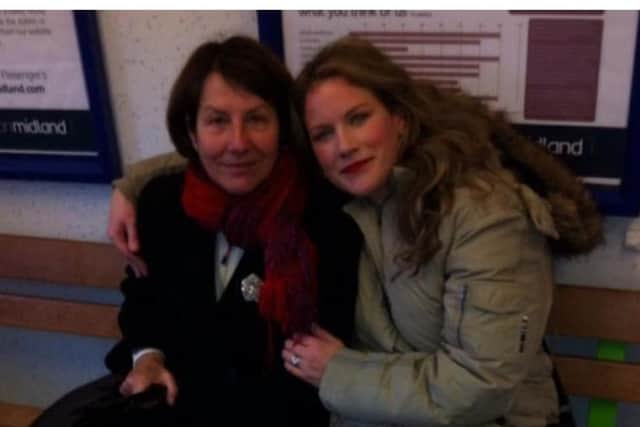Northern Ireland lagging behind rest of the UK in getting dementia diagnosed


There are over 22,000 people living with dementia in Northern Ireland, according to the Alzheimer’s Society, but last year there were only 14,600 people on the dementia register.
All health trusts saw an increase in the number of people being diagnosed with dementia between March 2015 and March 2019.
The Western trust saw a rise of over 33 per cent.
Advertisement
Hide AdAdvertisement
Hide Ad

However, the other four trusts all registered increases of under 10 per cent.
Northern Ireland has the fastest projected increase of people living with dementia across the UK – the number is projected to double to by 2040.
A drive to increase diagnosis rates and an ageing population were behind the increase in other parts of the UK, experts said.
NHS England said it was a priority to diagnose dementia earlier so people could receive correct treatment.
Advertisement
Hide AdAdvertisement
Hide Ad

The dementia registers of thousands of GP surgeries across the UK have been analysed by the BBC’s Shared Data Unit to paint a definitive regional picture.
Latest figures show there were around 508,000 people on the dementia register of England, Wales and Northern Ireland.
Professor Sube Banerjee, executive dean at Plymouth University’s Faculty of Health and professor of dementia, said: “What you’re seeing there is a reflection in the figures of NHS England’s strong priority to increase the diagnosis rate of people with dementia.
“Dementia research has less funding than cancer research.
Advertisement
Hide AdAdvertisement
Hide Ad“There is wide agreement that there is a need to increase the amount of research spent on dementia nationally and internationally.
Alzheimer’s Society, Northern Ireland’s leading dementia charity, welcomed the return of the Northern Ireland Assembly and the appointment of Robin Swann as health minister, but said concerted government action is needed to tackle the growing issue of dementia and the cost to the Northern Ireland economy and individuals.
The London School of Economics projects the total cost of dementia to Northern Ireland to rise to £2.36 billion by 2024 from £800 million now, an almost three-fold increase.
Bernadine McCrory, Northern Ireland director for Alzheimer’s Society, said: “Health Minister Robin Swann and the whole Northern Ireland Executive must take concerted action to ensure a robust strategy to fix dementia care.
Advertisement
Hide AdAdvertisement
Hide AdAmongst other things highlighted in an open letter, she called on the minister to “radically reform social care funding to address the costs faced by the growing number of people with dementia, ending the unfair daily injustice they, and their families, face in accessing and paying for the good quality care to which they are entitled which should be free at the point of need”.
In 2012, the government launched an initiative to increase the diagnosis rate of dementia.
At the time, it was estimated only 40 per cent of those living with the condition had been officially diagnosed.
Dementia care costs the UK just under £35bn per year. Two thirds of that is being footed by families rather than the government.
Advertisement
Hide AdAdvertisement
Hide AdCharities said care provision must improve, calling it a “ridiculous lottery”.
Kerry Hillier’s mother Stella passed away last year after being diagnosed with early-onset dementia in 2009 when she was 58.
Mrs Hillier, 41, is a full-time carer for her disabled son.
“It was apparent in 2007 that she was starting to decline,” she said.
Advertisement
Hide AdAdvertisement
Hide Ad“Her behaviour changed. When my son had to be taken into special care she reacted oddly to it. She was not treating it seriously.
“When she was diagnosed it was very much denial on her part. She did not accept it and it was very much an elephant in the room that we never spoke about.
“We started off with a companion – a friend – who came in and helped her with the housework, doing the things she would have done herself.
“Then, year on year, as she deteriorated, we had to look at a proper carer.
Advertisement
Hide AdAdvertisement
Hide Ad“We wanted to care for her at home and felt that she would be less agitated if she didn’t go to a care home.
“NHS funding that we got from direct payments was very small. We had to top it up with pensions and savings.
“I really felt that the whole system was very unfair and weighted against us.
“We went through a number of attempts to get NHS Continuing Healthcare.
“There was so much fighting and pushback and resistance.
“Over the last 10 years, care costs on top of direct payments are in the region of £100,000.
“This doesn’t include food and accommodation.”